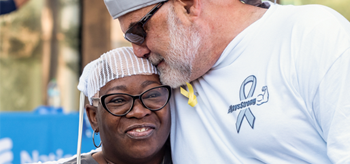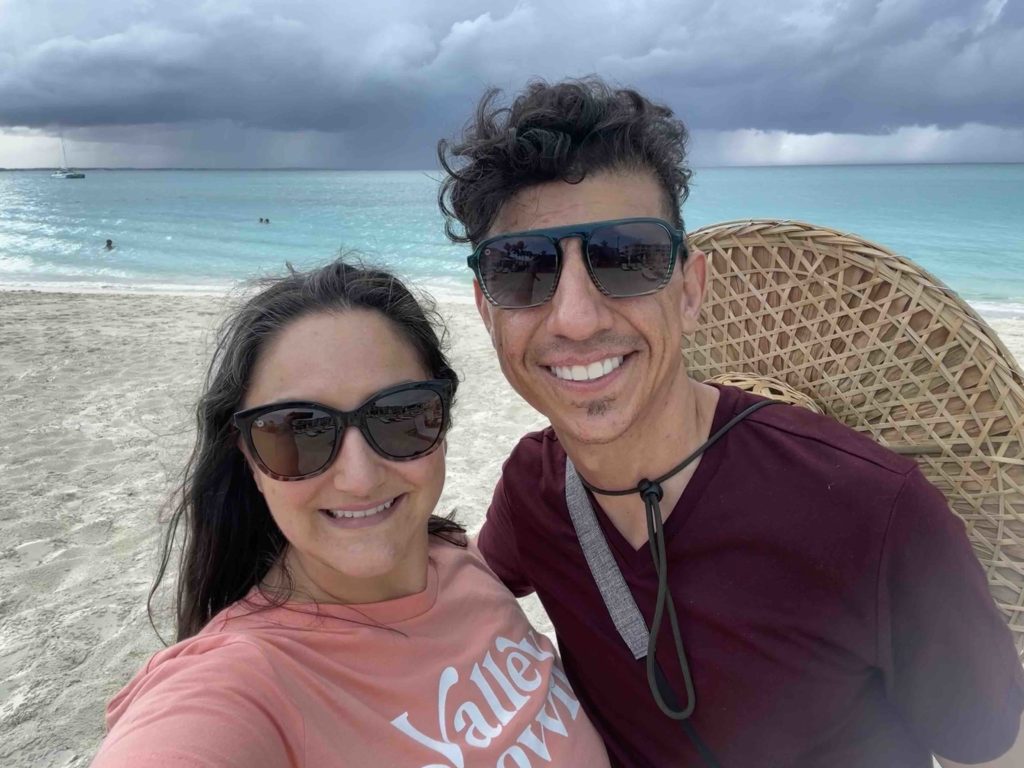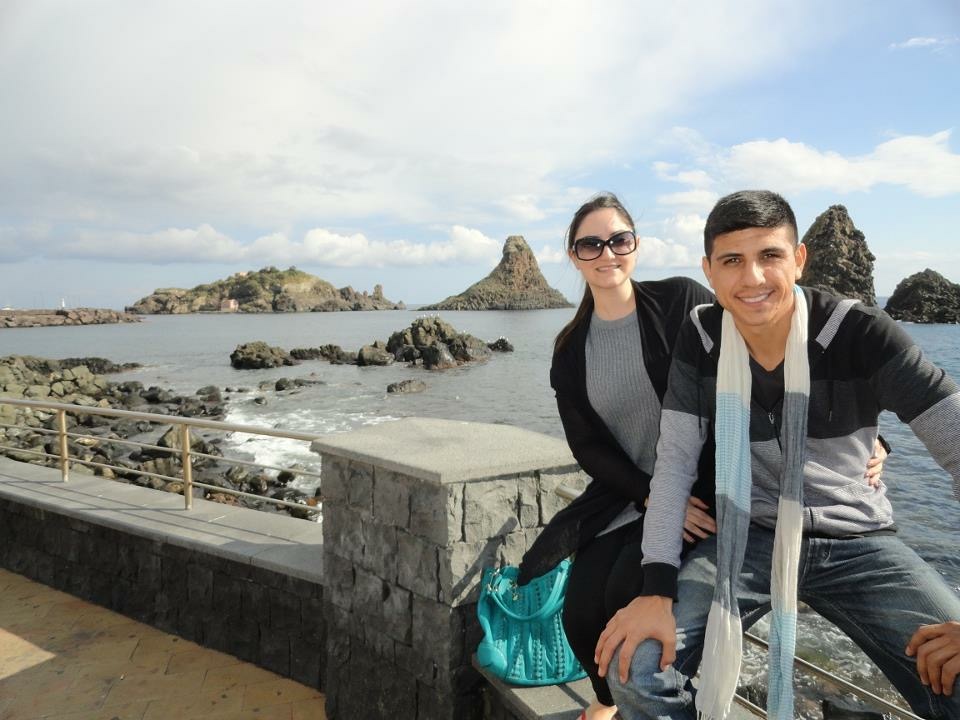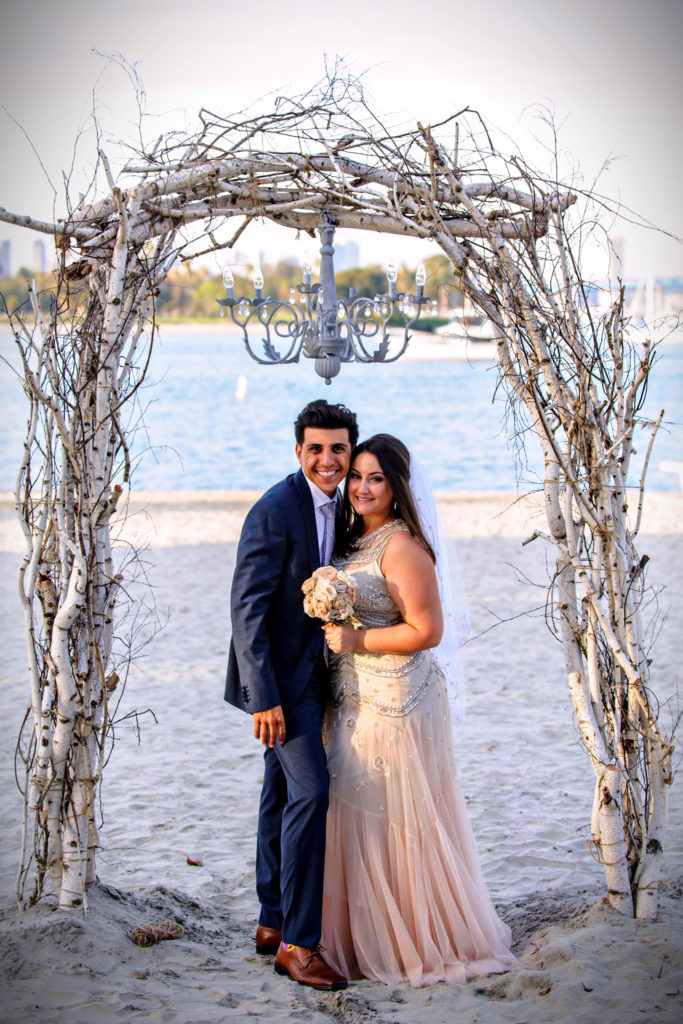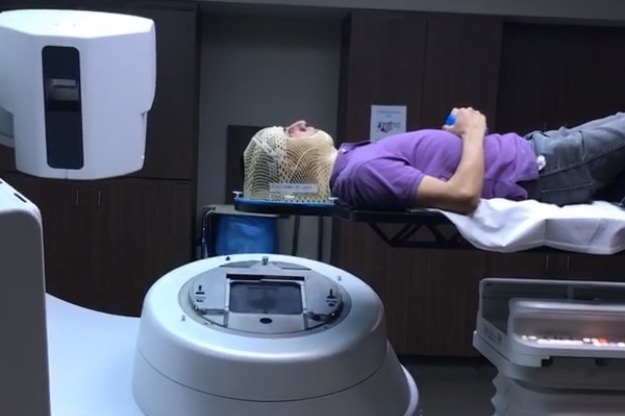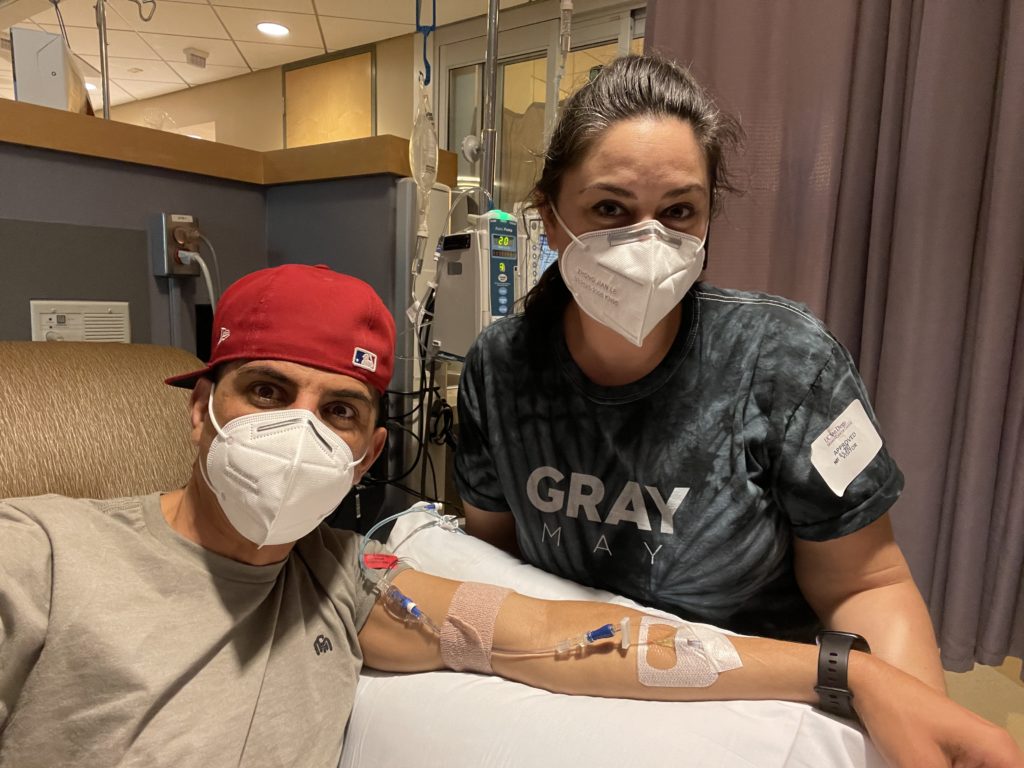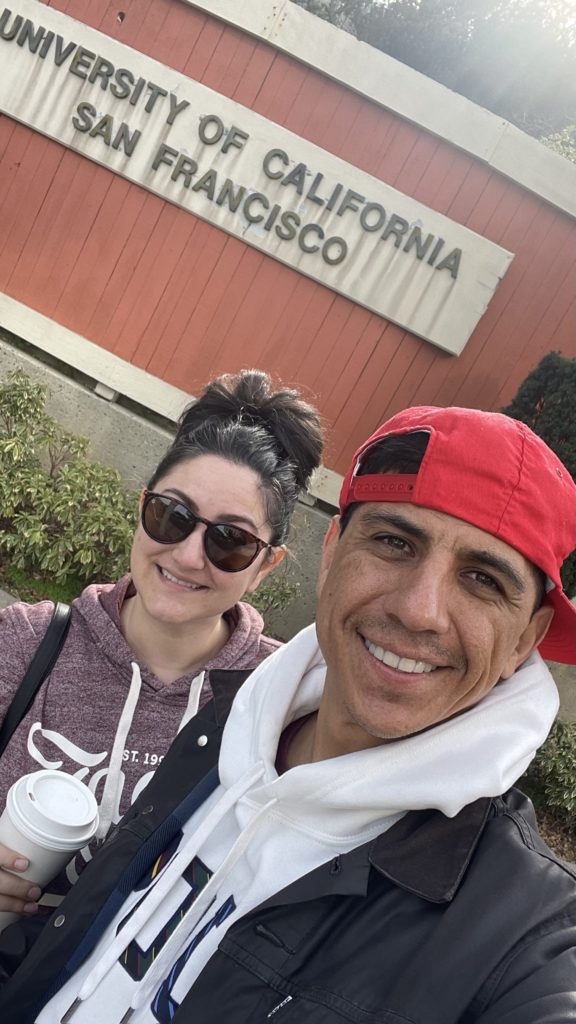Julio and Liz P. ventured to Turks & Caicos earlier this year to celebrate a couple of friends turning 40. Julio, who has anaplastic ependymoma, suffered a focal seizure while snorkeling. While swimming in the crystal clear turquoise water just offshore, he experienced an aura that indicated he was about to have a seizure. He alerted his friends nearby, who frantically waved to Liz on the beach. She charged into the water with his emergency Ativan pills.
A CT scan at the local ER confirmed no changes from his previous scans, so they continued the vacation with the approval of his health care team back home and made sure Julio rested during the hotter parts of the day.
“This is our reality,” Liz shared. “We are living life and pausing to rest and make adjustments as needed. Trying to find that balance between not letting cancer control our lives and not overdoing things to put Julio in a bad position. It’s an exhausting dance, but I couldn’t ask for a better partner.”
Liz and Julio Fall in Love
Liz and Julio’s relationship began as a friendship, growing closer over his 2008 Western Pacific deployment aboard the USS Ronald Reagan as a member of the Navy. When he returned to Lemoore, Calif., where he was stationed as a mechanic working on their F/A-18s, the two hung out all the time. Liz fell in love with Julio, who she describes as a charismatic and energetic man — the type of person who will run in the street backward in flip-flops to prove a point.
When Julio extended his contract with the Navy and moved to Sicily, Italy, Liz tagged along. The two lived overseas for almost four years.
“I would say that was the highlight of my naval career and my life because we were able to indulge in the culture,” Julio said.
Julio proposed to Liz on New Year’s Eve while in Venice during his stint abroad.
“She’s my lottery ticket,” Julio said. “I hit the jackpot. We started off as friends, and we ended up becoming more than friends. We were just meant to be.”
They began married life remodeling their home from top to bottom and traveling. Both have visited more than 20 countries together — Julio even more with his deployments.
“We like to see the world and how people live off of what they offer cuisine-wise,” Julio shared. “We usually go to the grocery store and market in different countries just to see what’s different.”
Julio Receives a Brain Tumor Diagnosis
Then in 2018, Julio began having 15-second episodes where he couldn’t speak. As the spells increased in length, he started going from specialist to specialist to find out why. Eventually, Julio visited a neurologist who ordered a scan that led to his brain tumor diagnosis.
A team at UC San Francisco (UCSF) performed an awake craniotomy. Two days later, Julio celebrated with clam chowder on Fisherman’s Wharf in San Francisco with Liz and his mother. After the operation, Julio underwent radiation to treat his brain tumor, and he had clean scans for two years.
“I feel like with his first surgery, everything went really smoothly,” Liz said. “It just seemed like it was done and out of our lives. I helped him recover from his surgery, took him to appointments, and took all the notes at the appointments, but that was the extent of my caregiving at the time.”
Life drastically changed when Julio experienced a recurrence with three tumors on the left side of his brain in Sept. 2020. Since then, Julio has undergone another operation, eight months of oral chemotherapy, Gamma Knife radiosurgery, and participated in multiple clinical trials.
Through it all, Liz has been a constant figure by Julio’s side.
“I was almost convinced that I was going to die,” Julio said after experiencing a grand mal seizure in May. “My eyes wanted to shut. I fought the feeling with Liz on my mind. My eyes were fixed on her. I love her. I was scared of death. Still am.”
Liz Steps Up as Julio’s Caregiver
A lot has changed for Liz and Julio since the couple exchanged wedding vows in 2013 and promised to love one another in sickness and in health.
“Before his diagnosis, I would have thought of a caregiver as a person who’s hired to provide care for a person who is seriously ill,” Liz said. “A lot of times that falls on family members because you’re there all the time, plus you want to be the person to provide the care for the people you love. My role has drastically changed, even from 2020 to now.”
For Liz, caregiving includes:
- Driving Julio to appointments
- Taking notes at the appointments
- Dealing with insurance challenges
- Organizing his schedule
- Making sure what he is eating won’t cause inflammation and create a bigger problem
- Minimizing fall risks by washing his feet
“I speak on his behalf whenever necessary, trying to relieve the burden for him, especially because he has some speech issues and delayed processing,” Liz explained. “He gets overwhelmed with a lot of information from his appointments.”
At one point in Nov. 2020, Julio could not weigh in on the conversation due to a lack of comprehension and speech. Liz had to decide whether to stay and let a person they didn’t know perform a brain operation or take a potentially dangerous trip back to California to have it with the team they knew and trusted. Liz especially felt the weight of being a caregiver at that moment.
“I turned each scenario over and over in my head and languished over the pros and cons, and then I cried,” Liz said. “And I cried a little more.”
Challenges of Medication Management
As Julio’s caregiver, Liz manages his daily medications because it has become too complicated and frustrating to handle on his own. Yet overseeing medications hasn’t been without its complications.
Unbeknownst to Liz, Julio ran out of his seizure medication, so she had not picked up a refill. As a result, he took his daily pills without his seizure pills in the pill organizer. Julio had a seizure at work that day and was in the hospital for three days.
“I’m not a medical professional in any way, so I do make mistakes, and everything’s not going to be perfect,” Liz said. “I will never make that mistake again. I triple-check the pills when I do them. I made this huge mistake, and it put him in the hospital. I felt terrible about it. I didn’t let that stop me from doing the pills for him. Sometimes that will happen when you’re not a trained medical professional and juggling 13 different pills.”
This experience taught Liz a valuable lesson, and she shares her experience with other care partners to show them they’re not alone in making mistakes.
“It’s tough not to be hard on yourself about it,” Liz explained. “Honestly, sharing that information was helpful because I discovered I was not the only person who had made a mistake like that before. Give yourself grace as a caregiver that everything you do isn’t going to be perfect.”
Finding Support as a Caregiver
For Liz, making time for self-care can be pretty challenging between work and caregiving.
“I do whatever I can to help move things along and make sure that Julio is getting the best health care and still be able to do things that are fulfilling and make him happy,” Liz explained. “It does feel like our whole lives are brain cancer right now. But there’s room for other things, too, and I try to ensure those things are there.”
Taking a short time to do Pilates or another physical activity has been a beneficial self-care activity. Finding small things to do in short stints has helped give Liz a little alone time.
“I’m not that good at meditating,” Liz said. “Doing something physical helps me shut out the other parts of my brain and distract me.”
The couple is also actively involved in three brain tumor support groups, including NBTS’s Brain Tumor Support Conversations.
“It’s really helpful to talk to people who understand exactly what you’re dealing with, even if they don’t have advice for you,” Liz said. “Because even with different types of brain tumors, ages, or areas of the world, there are certain things that we all deal with.”
Together, Liz and Julio take life one day at a time, knowing their love will carry them through whatever the future may bring.
“I’m a fixer,” Liz said. “I cannot fix that Julio has brain cancer, and that is a really difficult pill to swallow sometimes. I do everything in my power to keep him healthy and keep things moving forward with treatments, medications, and appointments. Still, I can’t take away what’s present in his body every moment of every day that threatens to someday cut his life shorter than he deserves. That is our reality.”


